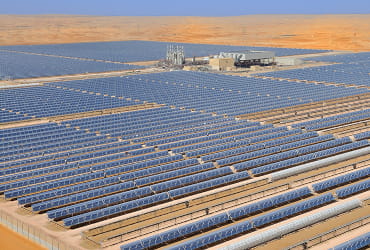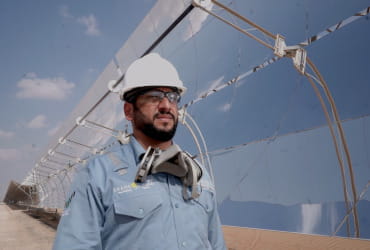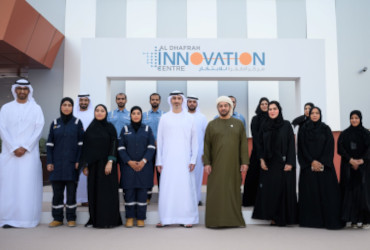Dawn of Shams is a solution and a model for UAE
- News
- Mar 16, 2013
Mega-projects such as Shams 1 are essential to the future of the UAE. But they also herald a change in attitude about the way we use resources, a new approach that should trickle down to all of us.
The opening today of the Shams 1 solar power plant marks the completion of a long and, in the truest sense of the word, pioneering project.
In The National today, engineers involved in the development explain how they used technological know-how and innovation to overcome obstacles of dust, sand and humidity. The stories make one marvel at the human ingenuity and persistence that brought to life an idea first mooted over 150 years ago.
Shams 1 is a remarkable achievement for the UAE. But it is also an essential one for the future. This country has been blessed with abundant hydrocarbon resources. But its population is growing and its hydrocarbon resources are - albeit slowly - diminishing.
It has long been clear that diversification is required. Increasing domestic demand for power, for desalination and all the other needs of a growing country, can in part be met via solar power, leaving more of the country's hydrocarbons to be exported at a profit.
Although Shams 1 is the largest solar energy effort in the whole of the Middle East and North Africa, it is only one stage in a much wider project. Shams 1 is part of the 2030 Vision for Abu Dhabi, which seeks, as a first step, to generate 7 per cent of the city's energy from renewable sources by 2020. But at the current output level, the capital would require 15 plants like Shams 1 to reach that target.
Fortunately Masdar, the Mubadala-owned company that owns a majority share in the Shams project, is looking at other solar-power projects, as well as windpower projects elsewhere in the world.
Mega-projects such as Shams 1 are essential to the future of the UAE. But they also herald a change in attitude about the way we use resources, a new approach that should trickle down to all of us.
Changing the way we get our energy is part and parcel of changing the size of our ecological footprint, both individually and collectively.
Weaning ourselves off hydrocarbons is part of a change that also includes reducing the amount of water we use and the amount of waste we generate. As the Shams project rises, these ideas will find themselves more openly discussed and embraced.
As more such plants are added to the deserts that surround the coastal cities, it is likely one day the UAE will be able to generate large amounts of its power from the most abundant and renewable resource of all: the sun.
Source: The National



